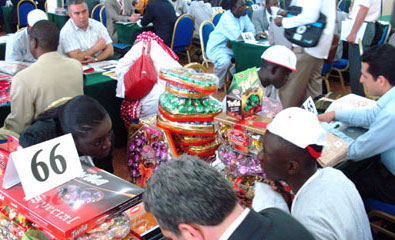Intercultural Dialogue Translating Into Commercial Ties
 Technological developments and globalization have significantly changed the means by which commercial relations are established. In effect, perhaps the entire nature of commerce has been transformed by the new realities of this increasingly interconnected world. However, one intrinsic element of conducting business has always remained the same and could never be replaced or challenged: trust. As healthy dialogue between communities always establishes strong feelings of mutual trust, it also translates directly into commercial relations benefiting all parties involved.
Technological developments and globalization have significantly changed the means by which commercial relations are established. In effect, perhaps the entire nature of commerce has been transformed by the new realities of this increasingly interconnected world. However, one intrinsic element of conducting business has always remained the same and could never be replaced or challenged: trust. As healthy dialogue between communities always establishes strong feelings of mutual trust, it also translates directly into commercial relations benefiting all parties involved.
It is true that many people are now doing business over the Internet without getting to know each other. But isn't it also true that, even if only through wires, we are searching for some kind of reliability on the part of our trade partners? Don't we look for the comments of the previous buyers who bought a certain product from a Web site in the past? Well, the answers are becoming increasingly clear considering the frequency of headlines about cyber fraud. So, one way or another, trustworthiness is a virtue always sought after in the business world. And how has humankind established trust for centuries? Friendly interaction and dialogue come first among the possible responses to this question.
Since isolation from the world is no longer possible for any state or community within this "global village," there are two options for everyone in the face of increasing interconnectedness: understanding all the side effects of globalization and aiming to benefit from it or confronting globalization while being unprepared to receive the heavy blows it deals out. No further inquiry is needed as it has already been shown many times by academia that globalization is creating winners and losers, without leaving anyone in between. The intercultural dialogue activities initiated by the Gülen movement, a faith-based social movement named after Turkish Islamic scholar Fethullah Gülen, are in a strategic position in that regard, particularly with the hundreds of schools it has opened worldwide.
Those schools are seen as islands of peace by many people. "Take Bosnia, for example. I am sure the atrocities and the bloodshed that took place between 1992 and 1995 are still fresh in everyone's memories. Today, Serb, Croat and Bosnian students are receiving the same education in the same classrooms in a school opened by the movement. They are growing up together while being taught that their religious, ethnic or other differences do not preclude the possibility of peacefully coexisting and living side by side. Adapt this now to India and even to the West and developed countries," said Mustafa Yeşil, chairman of the executive board of the Journalists and Writers Foundation, a Turkish NGO emphasizing the importance of intercultural dialogue for understanding and for the establishment global peace, in an interview with Today's Zaman.
On the subject of the underlying goals of these schools, Gülen himself confirmed that they specifically aim to lay the foundations for durable dialogue between cultures. With this dialogue being established between even the most remote communities, increasing trade is only one of the many benefits of this process. Today's Zaman columnist Kerim Balci came to the same conclusion in an article on Dec. 5, 2007. "The bridges of love and gratitude fostered in these schools in time turn into a web of bridges between all the countries Turkish schools operate in," he wrote. He supported his point in the same article by pointing out that most of the participants at the Turkish Confederation of Businessmen and Industrialists' (TUSKON) 2nd Turkey-Eurasia Foreign Trade Bridge held in December 2007 came there "thanks to the Turkish schools opened by Turkish philanthropists in the 13 countries joining the summit."
Thus, as they continue to educate students and invest in dialogue between different cultural, racial, religious and ethnic communities, these schools will always establish trust between people and help all of them benefit from the inevitable process of getting closer due to the ever-increasing impacts of globalization.
- Created on .
